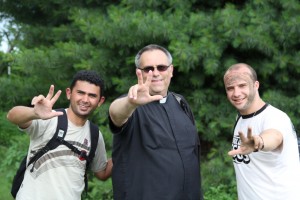 This week Archbishop Charles Chaput upon taking his role as head of the Archdiocese of Philadelphia published a statement in First Things magazine. He stated that in that past, our secular world still had an overwhelmingly religious base, but this was no longer the case. He warned therefore, that the current America is becoming increasingly hostile to religion.
This week Archbishop Charles Chaput upon taking his role as head of the Archdiocese of Philadelphia published a statement in First Things magazine. He stated that in that past, our secular world still had an overwhelmingly religious base, but this was no longer the case. He warned therefore, that the current America is becoming increasingly hostile to religion.
He also warned that there is no more place in our faith for any lukewarm religion. These are profound words for any Catholic church leader to make. They are a warning and are not unseen by many in the Church today. They lead us to today’s parables and to a question, How do we find God’s kingdom. An answer is: The greatest treasure is Divine Wisdom, seek it above all
Jesus’ tells three parables today, two similar and the same genre but a completely different perspective. In the first two Jesus is asking how much we value our relationship with God in the light of other things.
In the ancient days and really until not many centuries ago, one form of safe deposit box was to bury your valuables  underground secretly where they could not be found. Indeed, this is the famous reasoning behind a pirate’s buried treasure as well. So we see someone who finds such a treasure in field. It is more valuable than anything else in his life and then he orients everything in his life in pursuit of that buried treasure. The parallel to ourselves is obvious.
underground secretly where they could not be found. Indeed, this is the famous reasoning behind a pirate’s buried treasure as well. So we see someone who finds such a treasure in field. It is more valuable than anything else in his life and then he orients everything in his life in pursuit of that buried treasure. The parallel to ourselves is obvious.
In the second the seeker is already in search for a valuable pearl, but finds one that is even greater than any of his expectations and orients his life accordingly.
Jesus tells us elsewhere that where our treasure is there also is our heart. So the obvious question is what is our greatest treasure and what would we sell or eliminate from our lives to obtain that treasure. This would help us prioritize what we value in light of what is most valuable. Notice in the parables, everything the respective finder possesses loses its value in light of the discovery. The greatest treasure is Divine Wisdom, what would you give up to get it.
A key to this question can be found in the third parable. Notice what is happening we have the fruit of most likely a dragnet. What is removed is that which is less human and Jesus compares it to the wicked and the righteous. Now the righteous he means are the just, the people who do the right thing hopefully in the name of love of God and love of neighbor. But the wicked is an interesting word. The Hebrew term for wicked I learned does not have the same meaning as the english term. Wicked meant to pervert the reason for something’s existence.(cf http://jewsandjoes.com/what-does-the-word-wickedness-mean-in-hebrew.html) So, for example, if I use a house as a place den of drugs then I am perverting the use of a house and therefore I am acting in wickedness. Or let me give you another example, taking a human embryo and using it for experimentation.
Therefore, when we look at what that which is sold in the first two parables in order to buy the buried treasure or the pearl of great price, the answer is simple. It is that group of philosophies that look like gold but ultimately have no value in our lives. The pearl, the buried treasure are both symbols for what the bible calls the wisdom of God. The only way to find it is to seek it in our relationship with God. The greatest treasure is Divine Wisdom, seek it above all
 I am sure you are aware of fool’s gold, it is iron pirite and looks like gold, but is only as valuable as iron. An ounce of iron pirite is not going to be worth enough gas money to get you a mile down the road, but it looks pretty.
I am sure you are aware of fool’s gold, it is iron pirite and looks like gold, but is only as valuable as iron. An ounce of iron pirite is not going to be worth enough gas money to get you a mile down the road, but it looks pretty.
The successful prospectors during the Gold Rush were those who knew the difference and the rest who made it were the wisest ones who knew that the real money was in selling tools to the prospectors.
This brings us back to Archbishop Charles Chaput—that puts us at odds with the secular world is what we both treasure but we define differently and that is freedom. Archbishop Chaput explains that our American sense of individualism which is a form of freedom Americans treasure above all things runs into conflict with the Christian form of freedom which is being what we were created to be in the fullness of our humanity. The American Secular form of individualism of let me free to do what every I want, good or bad period. The Christian form of freedom is Lord make me everything you want me to be. They are radically different and at times in conflict with each other.
That understood, which do you value more, human freedom that God grants you by forming you into all He creates you to be, or individualism which is let me do what I want and leave me alone.
If you value what God has to offer, what will you give up to get it including the secular definition of freedom Archbishop Chaput alludes to is the foundation for tyranny? What philosophical fool’s gold will you put back in the ground and what gold in the form of Divine wisdom will you embrace.
The days of valuing the world’s fool’s gold at the same price as God’s divine wisdom are over. Tomorrow begin your day asking the Lord to enlighten you and bestow upon your everyday more and more of the greatest treasure which is wisdom.
God Bless You,
Fr. Robert J Carr
You can follow him on twitter as @frbobcarr
Thoughts, comments on the homily? Let us know at Facebook

